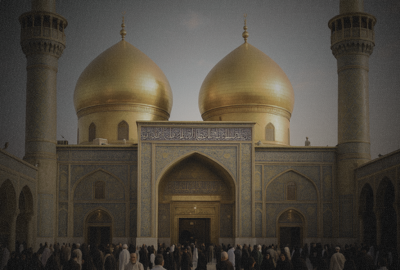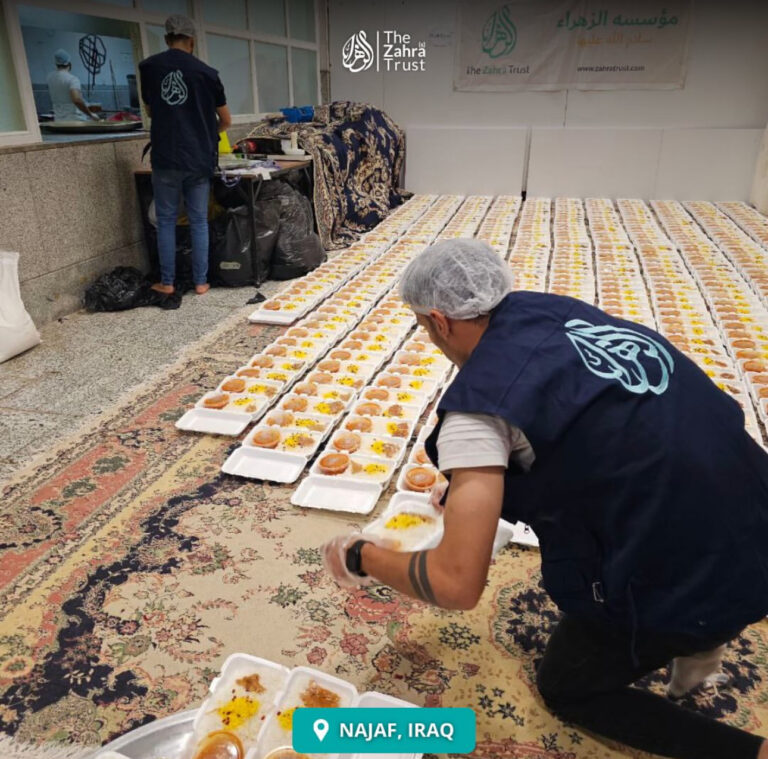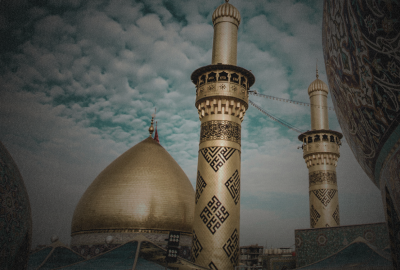5 Hadiths from Imam Al-Kadhim (as)
The 7th of Ṣafar marks the wiladat of Imam Musa Al-Kadhim (as), the seventh Shia Imam. Although this day passes quietly due to the somberness of the months of mourning, his life and teachings remain a source of light and guidance for all who seek truth, patience, and closeness to Allah (swt).
Imam Al-Kadhim (as) lived in a time of great political repression, yet his character embodied serenity, endurance, and divine knowledge.
In honor of this noble personality, here are five of his profound hadiths that offer insight, inspiration, and direction for those walking the path of faith.
1. The Best Form of Charity
Imam Al-Kadhim (as) is reported to have said, “Your assistance of the weak is one of the best forms of charity.” (Tuhaf al-Uqul, p.414)
This hadith deepens our understanding of charity beyond monetary transactions.
Whether it’s through financial help, offering protection, giving time, or simply standing by someone in hardship, supporting those who are vulnerable holds immense value.
Imam Al-Kadhim (as) teaches that the measure of charity lies in how we serve the weak: not just in what we give, but in how we care.
Allah (swt) says in Surah Aal-Imran, “You shall never attain the (perfect standard of) righteousness until you spend (in charity) from (the wealth) that you love; and whatever you spend, Allah (swt) surely knows it.” (3:192)
This verse is a reminder that true virtue often lies in sacrificing what is most precious for the sake of those in need.
2. Neighbourliness
The Imam (as) is reported to have said, “Neighbourliness is not only to desist from annoying (one’s neighbour), but also to forbear annoyance (from him).” (Mizan al-Hikmah, h.2779)
Good character isn’t just about avoiding harm; it’s about showing restraint and patience when harmed.
Imam Al-Kadhim (as) teaches that true neighborliness is measured not only by how peacefully we live beside others, but by how we absorb and overlook their mistakes.
This kind of forbearance strengthens the community and reflects the higher ethics of faith.
Allah (swt) says in Surah an-Nisa, “Worship Allah (swt) and do not associate anything with Him, and be good to the parents, the relatives, the orphans, the needy, the immediate neighbour, the distant neighbour, the close companion, the stranded traveller and (the slaves) whom your right hands possess. Surely Allah (swt) does not love him who is proud and boastful.” (4:36)
This verse serves as a reminder that kindness to neighbours is not optional. Rather, it is a command rooted in tawḥīd itself.
3. Trials and Levels of Faith
Imam Musa ibn Ja’far (as) is reported to have said, “A believer is like the two sides of a balance: the more faith he has, the more ordeal he sustains, so that he meets Allah, the Exalted, without any sins.” (Bihar al-Anwar, v.67, p.243)
True faith is not established in ease, but in endurance. Imam Al-Kadim (as) compares the believer to a balanced scale, steadily tested in proportion to their faith.
These hardships are not punishments, but a way to purify us. Through patience, the soul is cleansed so it can return to Allah (swt) free of sin and full of light.
Allah (swt) says in Surah al-Ankabut, “Do the people reckon that they will be left to say, ‘We believe,’ and they will not be tried?” (29:2)
Every trial is a step toward meeting Allah (swt) with a purified heart.
4. The Power of Supplication
The Imam (as) is reported to have said, “I urge you to supplicate, for verily supplication to Allah (swt) and seeking from Allah (swt) repels calamity which may have been destined and decreed with just the execution remaining, so if Allah (swt) is supplicated and is asked to avert a calamity, it is averted.” (Al-Kafi, v.2, p.470)
This hadith reminds us that even when trials are written, a supplication can change the course of what comes.
The Imam (as) urges us never to underestimate the power of sincere prayer. It is not a passive act; it is an active force that can delay, soften, or entirely avert what was otherwise destined to fall upon us.
It is no coincidence that this Imam is known as Bab Al-Hawa’ij (the Door to Fulfilling People’s Needs). Countless hearts have turned to him in times of desperation, and his life continues to echo the mercy of a Lord who listens.
Learn more about the duas of the Ahlulbayt (as) here.
5. Ziyarah of Imam Hussain (as)
Imam Al-Kadhim (as) is reported to have said, “When one sets out to perform the Ziyarah of Imam Hussain (as), Allah (swt) will appoint an angel on him who will place his finger on his back and will begin writing each word that comes out of his mouth till he arrives at the shrine.” (Kamil al-Ziyarah, ch.62, n.7)
Learn more about the sacrifice of Imam Hussain (as) here.
Every word of longing and every whispered prayer during the journey to Karbala is recorded by an angel.
The very act of setting out in love and remembrance becomes an act of worship, with divine attention on every step and spoken word.
In the same hadith, the Imam (as) continues, “After he exits the shrine gates, the angel will place his palm on the middle of his back and says, ‘All your past sins have been forgiven; so continue with the good deeds.’”
Forgiveness greets the visitor upon leaving the sacred ground.
The Imam (as) shows us that the ziyarah of Aba Abdillah (as) is more than a journey. It is a purification of the soul, a renewal of purpose, and a divine invitation to live a life of righteousness.
Conclusion
The words of Imam Musa Al-Kadhim (as) remind us that faith is lived through patience, compassion, and connection to the divine.
His teachings guide our actions, and our love for the Ahlulbayt (as) fuels our journey back to Allah (swt).
As the lovers of the Master of Martyrs (as) make their way to the beloved (as), many do so in hardship, yet with hearts full of devotion.
This Arba’een, honor Imam Al-Kadhim (as) by supporting the zuwaar on their sacred path. Help ease their burden and share in the reward of their journey.
Learn more about Arba’een here and how you can get involved today.
FAQs
He was the seventh Imam from the family of the Prophet (saww), the son of Imam Jaʿfar Al-Ṣadiq (as), and known for his deep knowledge, patience, and worship.
“Al-Kadhim” means “the calm” or “the restrained”. It reflects the Imam’s (as) incredible patience and forbearance, especially in the face of injustice.
He was born on the 7th of Ṣafar, 128 AH (approximately 745 CE), in either Medina or Abwaa (a village between Mecca and Medina).
He was buried in the Quraysh Cemetery in Baghdad. The area has since been renamed Al-Kadhimiyyah or Kadhimayn. He is buried with his grandson and the ninth Shia Imam, Imam Al-Jawad (as).
He is known as “The Door to Fulfilling Needs” because many people have experienced their prayers answered through his intercession.










